RV Converter VS Inverter: What’s the difference?
If you’re new to RV electric systems, terms like converter, inverter, and charger can make your head spin. Many youtubers use these words interchangeably (or incorrectly) further adding to the confusion.
In this article, we’ll simplify the definitions and clear up the confusion. Let’s get started!
DC Power vs AC Power
Before you can understand what an inverter or converter is, you should familiarize yourself on the difference between DC (direct current), and AC (alternating current) power.
AC power runs your typical household electronics. That means anything that plugs into a wall socket is using AC power. It commonly comes in 120v or 240v form.
- Examples: Hairdryers, microwaves, coffee pots, blenders.
DC power is the type of power stored in batteries. Anything that plugs into a USB outlet or cigarette lighter uses DC power, and vehicles use DC power to run their electrical systems. It commonly comes in 12 volt form.
- Examples: Cell phones, lights, vent fans, water pumps, battery bank
Here’s where things get tricky: When you park an RV at a campsite and plug into city power, you are using AC electricity (from the grid). When you travel off-grid and run a camper with a battery bank you are using DC electricity (from your batteries).
Inverters and Converters allow you to switch between the two power sources.
| Converter | Inverter |
|---|---|
| Converts AC power to DC power | Converts DC power to AC power |
- Converters and Inverters are mirror functions of each other
- Converters turn AC power to DC power
- Inverters turn DC power to AC power
- You need a converter to get city power into your battery bank
- You need an inverter to run your household AC electronics from the battery bank
- An inverter/charger combines both a converter and an inverter
- The “charger” part of the name refers to a converter
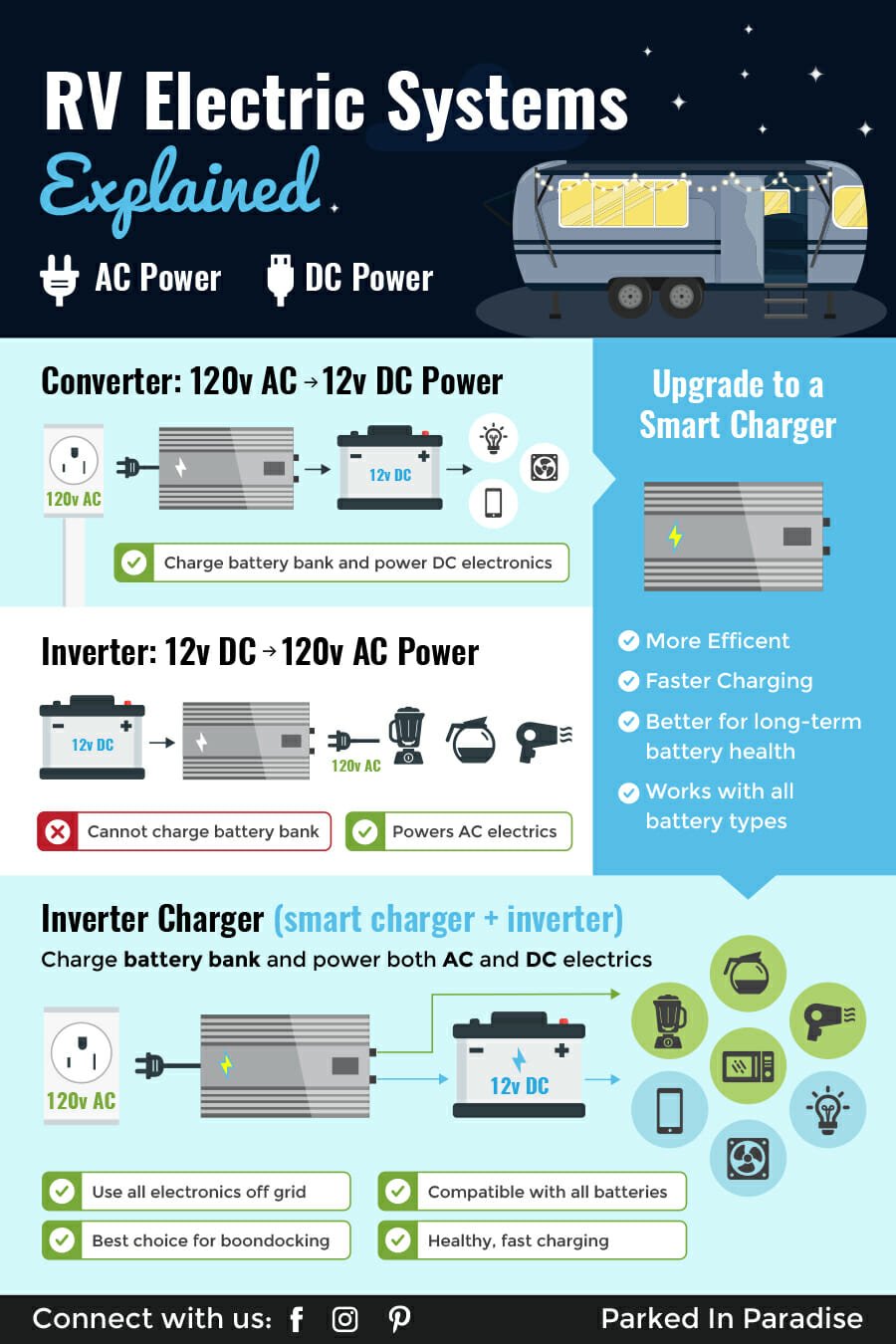
Converting Power
As stated previously, you cannot charge a battery bank directly with 120v AC city power. You need to first convert that power into 12v DC form so it can be stored in the batteries; and that’s where converters come in.
Converters are often referred to as “chargers”, because their primary function is to charge batteries.
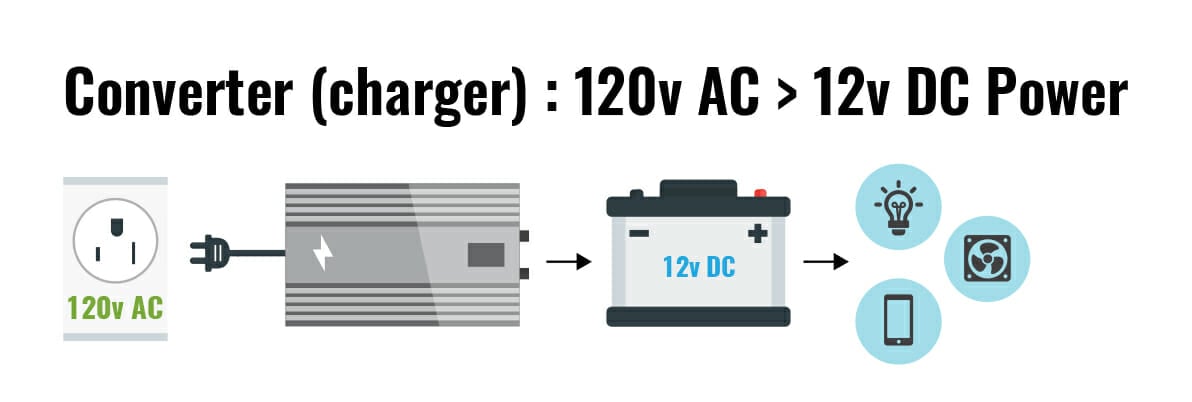
Converters
Your typical RV comes with a converter built-in. These are simple, single-stage systems which convert 120v AC power to 12v DC power and slowly charge up your battery bank while simultaneously powering your RV.
Converters work well when you’re plugged into city power frequently. This is the best solution when you spend all of your time at RV parks with hookups.
However, if you plan to travel off-grid often you should consider upgrading to a smart converter (multi-stage converter) because they are more efficient.
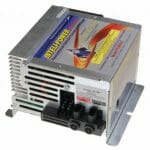
Smart converters (smart chargers)
Smart converters work just like converters, but charge batteries faster and more completely. A smart converter will sense how full your batteries are and adjust amperage and voltage to charge them in an efficient way.
They charge through four stages: bulk, absorption, float and equalize.
When the batteries are depleted, a smart charger ramps up the amperage until it gets near full capacity. Then it restricts amperages and decreases voltage to top off and balance without throwing away extra power or damaging the batteries. This is known as multi-stage charging.
Why you should upgrade a converter to a smart converter
- Smart converters charge your battery bank faster, that is especially useful if you’re using a generator to charge your batteries.
- Smart converters are better for your long term battery health.
- Standard converters are not compatible with lithium batteries.
- If you’ve upgraded batteries from flooded to AGM or Gel, your old converter might be improperly charging them. This can damage the new batteries.
Replacing your converter
Replacing your converter is a relatively simple process. They are normally located underneath the AC breaker panel in an RV. We recommend these smart converters to upgrade to:
70 amp Inteli-Power 9200 Series Converter
Built-in Charge Wizard to recharge to battery 90% in 2-3 hours
Boost mode, normal mode, storage mode
60 amp Lithium-ion PD9160ALV Converter/Charger
Reverse Battery Protection
Battery management system (BMS)
Automatic Thermal Protection
Installing an RV smart charger
Inverting Power
If you want to go off grid and run a laptop, hairdryer, coffee pot, microwave or anything that plugs into a standard household wall socket, you’re going to need an inverter.
Inverters are the opposite of converters. They take 12v battery power and turn it into 120v AC power.
Inverters are popular in DIY camper vans, but they are only as good as your battery bank. You’ll need replace the power you use with either an inverter charger, generator, or with RV solar panels and a charge controller.
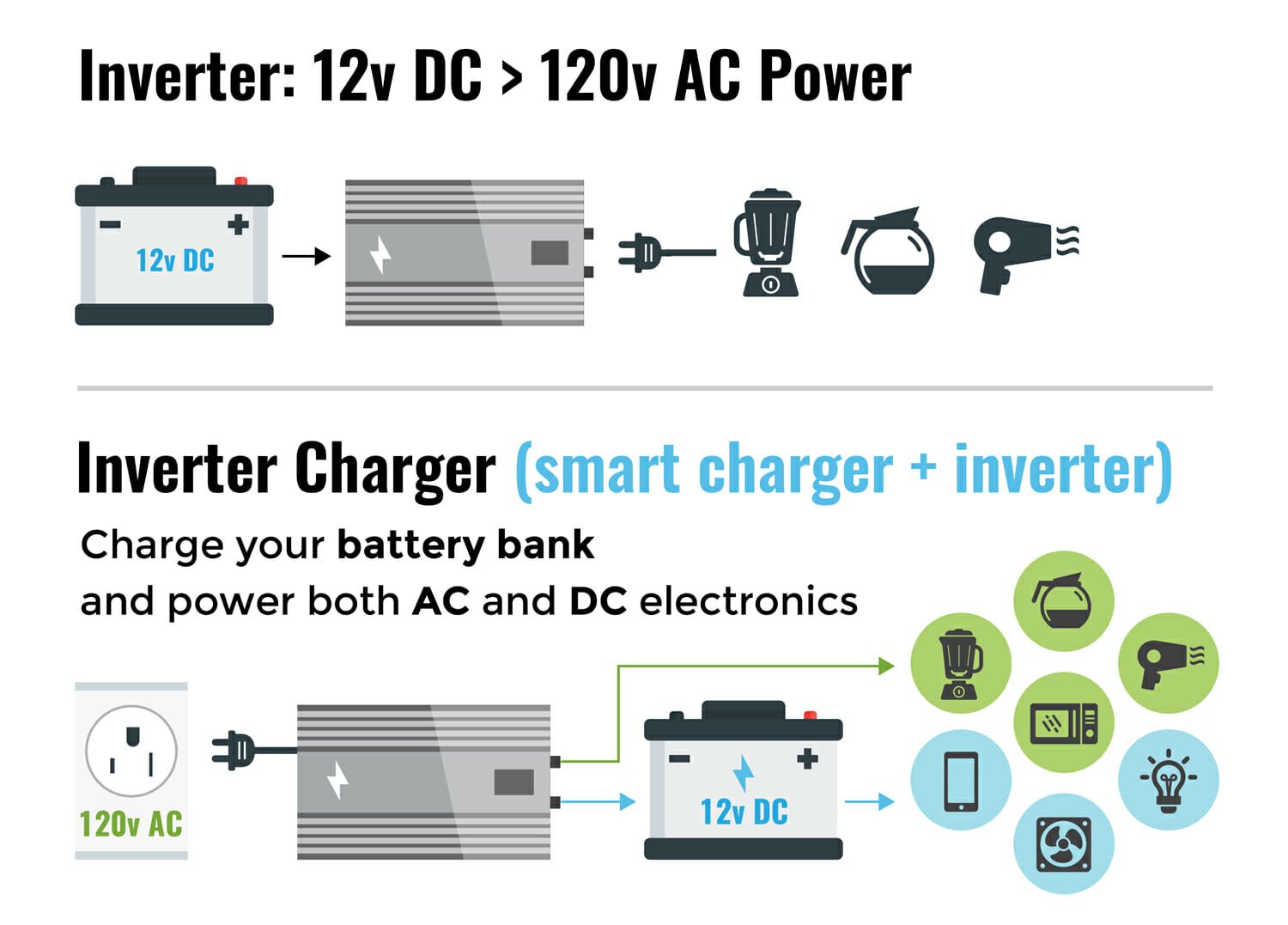
Inverter Charger Combos
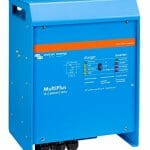
Inverters combined with smart converters are called inverter chargers. They can charge your battery bank with city power and also provide power to run household electronics from your batteries. This is the best of both worlds.
Why you should upgrade a converter to an inverter charger
- They can charge your battery bank.
- They have all of the benefits of a smart converter.
- You can use all of your electronics off-grid.
- One unit does the job of two devices.
- Most come with an automatic transfer switch so you don’t have to manually turn them on and off like a standard inverter.
- Many inverter chargers have an automatic generator start feature. If the batteries drop too low, the inverter will send a signal to the generator to turn on and run until they are topped off again. This will keep the battery bank full and the electricity flowing without a touch.
- They are compatible with all battery types.
Is an inverter necessary?
You can rely on battery power and 12v electronics when camping off-grid. Many people living in a van choose to go this route because it is simple. If you don’t have an inverter you can still use lights, vent fans, 12v portable refrigerators or other small electronics. You just won’t have any powered household wall sockets.
Inverter chargers are significantly more expensive than a smart converter. If you don’t plan to do a lot of boondocking, save yourself some money and stick with a smart converter.
The Best Inverter Chargers For RV
- 2000W continuous, 6000W surge (20 seconds)
- 16A, 120V pure sine wave
- 70A smart battery charger
- 3000W pure sine wave inverter; 4800W surge (5 seconds), 6000W surge (1 second)
- 120V pure sine wave
- 125A battery charger
- 3000W continuous, 6000W surge output
- 120V pure sine wave
- 150A battery charger
- 3000W continuous, 6000W surge output
- 25A, 120V pure sine wave
- 120A battery charger
Installing an RV Inverter Charger
FAQs
What is the purpose of a converter in an RV?
A converter in an RV is designed to transform 120V AC power from a shore connection or generator into 12V DC power for charging the battery bank and running 12V electronics.
Do I need an inverter or converter for my RV?
It depends on what you plan to use your RV for. If you are mostly staying in campgrounds and need to run household electronics, an inverter charger is the way to go. If you will be mostly off-grid and only using 12v electronics, a smart converter is enough.
Is a power inverter the same as a converter?
No, an inverter takes 12V DC power from a battery bank and turns it into 120V AC power for household appliances. A converter takes 120V AC power from a shore connection or generator and converts it to 12V DC power for charging the battery pack and running 12V electronics.

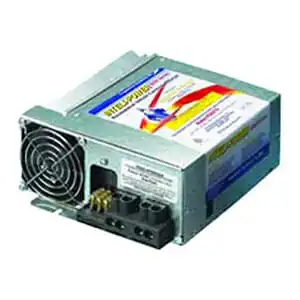
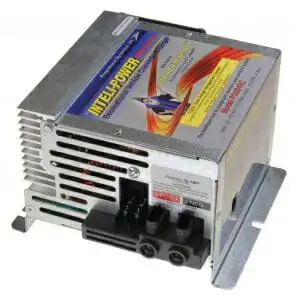
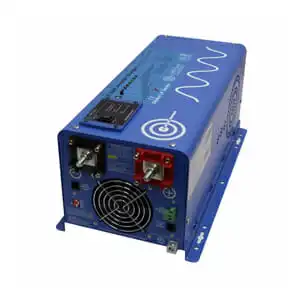
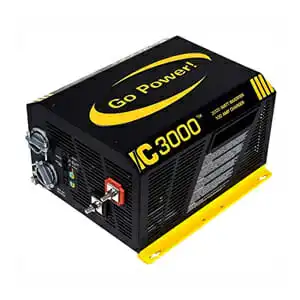
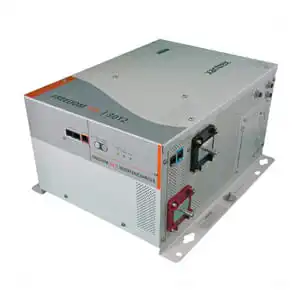
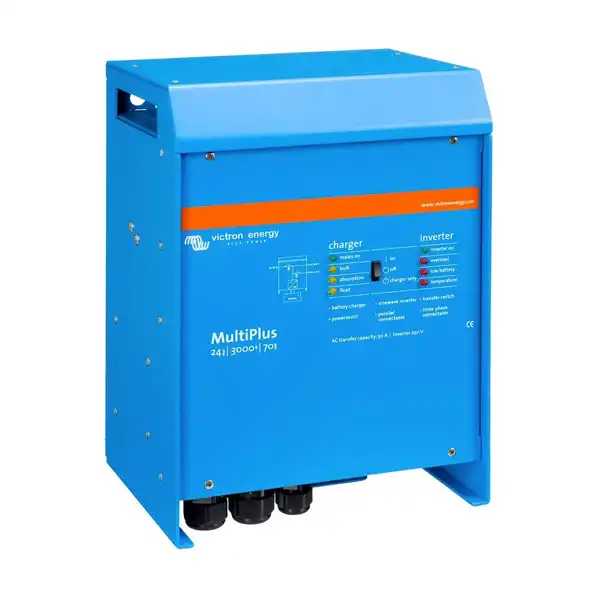
I am working on a project to provide continuous power to 3 ByteSpeed servers; P/N R2308WTTYSR; and 4 HP POE switches. The thought is to use 6 deep cycle batteries connected to an inverter/charger. The servers are rated at 1100 Watts each and I have not been able to find the ratings on the switches, but I am sure it is substantially less than the servers. We would like the servers and switches to be powered by the utility company power, but in the case where power is lost to seamlessly switch to the inverter. We would also like to have the ability to integrate a Smart system that would correctly shut down our servers in the event we would lose power from the electric company. If you have any suggestions or recommendations, it would be appreciated. Thanks, Jim Courtney (Tech) at Booneville School District; Booneville, AR
just buy a couple of APC 3000 battery backups, connect your servers to them, and install the software that comes with the battery backups, the software can be configured so that it they will do a graceful shutdown if the battery level goes to low (remember in the bios of the servers to change it to power the servers up once power is restored). You could get a generator that’s hooked up to the same electric circuit that those APC’s are on, so if power is lost, the generator kicks in, putting power to the batteries, which in turn keeps the servers up. Make sense? I have have a ton of equipment in the server room, and the way i set it up (as above) works like a dream. Reply back here to me, if you need more info, as i didn’t use my real email address here.
I have an rv (class A, Thor Vegas) that when I plug in to shore charges my battery. I am installing an inverter OR inverter charger. why would I need an inverter charger when the the rv already charges the battery? wouldn’t an inverter do what I need? why would I go with and inverter charger, not just an inverter?
I am just now designing a conversion for my minivan and will be traveling about once a month in it and using it at the beach here in San Diego. But not living in it at least not yet. And need power for night time heater ( need heater suggestion too, it does not get too cold here) and power for reading and powering laptop and also need suggestions of best way to occasionally cook in my van safely . I am going to have a small kitchen area. And my van windows do open in the conversion area which is really nice for venting. Thanks for the advice.
Also can you give a step by step explanation and install for a solar system that would work well on a minivan? From solar panel to? then to? like that? Thanks very much.
I use PowerMax in a party bus when we are at events and don’t want the bus running, but still want to use all the equipment onboard. It powers a 55″ tv, Nintendo switch, Karaoke machine, 100′ of led lighting, a massive sound system 2 6000 watt amps and 4 subs, 2 led light bars, and all the outside bus light all at the same time. The fan comes on and puts out a little heat, but my volt meter stays at 14 volts. We have used this at multiple all day events and it works Great!! I also love that it is just a 110 v. plug so it is easy to plug in. I am going to put one in my RV so I am not always trying to find special plugs.
Ensure that the charger is equipped with a blocking diode that can provide utmost protection against overheating and overcharging. Features like discharge and battery drain prevention are also nice to have.